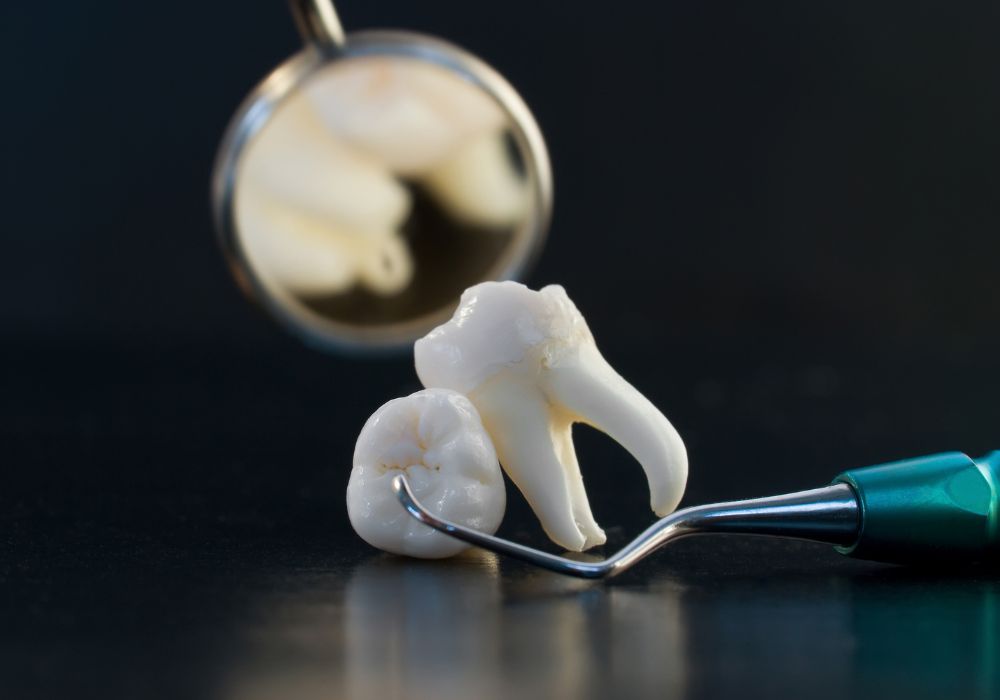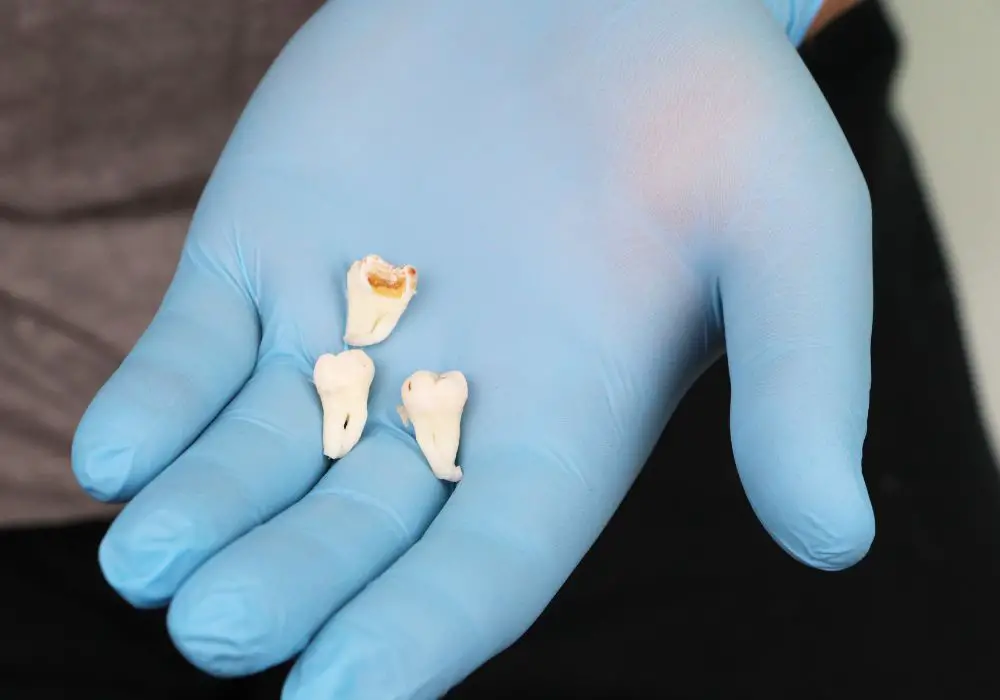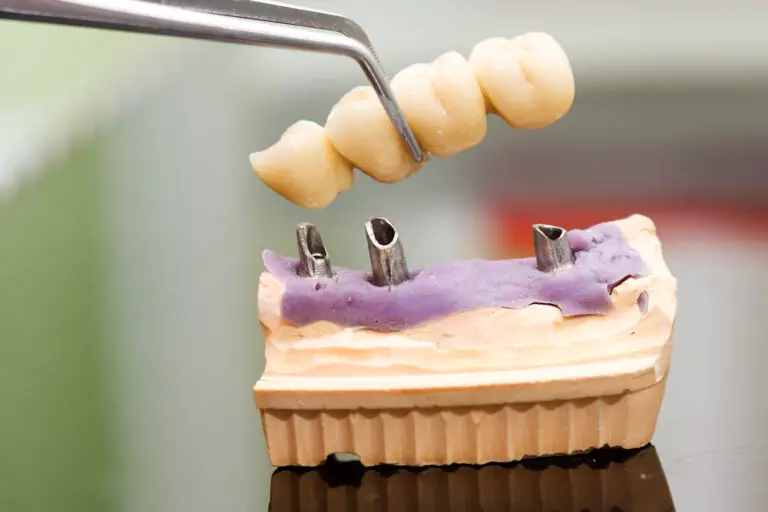Wisdom teeth are a fascinating part of our biology but for many people, they can be a nightmare. They push through much later than our other teeth, often leading to pain and discomfort.
If you or someone you know are struggling with them, you’re probably wondering how many wisdom teeth do you have.
We’ll have all the answers for you right here. Along with the key question, we’ll look at wisdom teeth in more detail and give you all the facts. Without further delay, let’s get started!
How Many Wisdom Teeth Do You Have?

Most people have four wisdom teeth once they reach adulthood, and there should be one in each back corner of your mouth. While the majority of us have four, it’s not uncommon for people to be missing one, or even all four, of their wisdom teeth.
How many people are missing these teeth? Well, it’s hard to say. A Harvard University study of over 60,000 people found that 23% of people had missing wisdom teeth that were never formed. Other people form wisdom teeth, but they never come through.
These teeth only come through when we’re an adult, so you can’t know how many teeth an older child will have without doing an X-ray. If you want to know if you have all your wisdom teeth, then the easiest thing to do is count them.
How To Count Your Teeth

A human adult should have 32 teeth but if you don’t have your wisdom teeth, you may have fewer than that. These are split equally, so you have 16 on the bottom jaw and 16 on the top. And further to this, those 16 are split evenly, so you have eight teeth on each side of your jaws.
Let’s look at what these eight are:
1 Central Incisor – This is one of your two front teeth
1 Lateral Incisor – Next to the central incisor is the lateral one
1 Canine – We have one canine in each corner of our mouths, so four in total
2 Premolars – These are small and flat teeth used for chewing
3 Molars – These are used for chewing and are your largest and flattest teeth
Knowing this makes it easy to work out if you have wisdom teeth. The easiest thing to do is simply count how many molars you have. If you have two on one side of your mouth, then you don’t have wisdom teeth.
While that’s the simplest way, it can be easy to confuse your molars with your premolars. Instead, you can just count how many teeth you have on each side of your mouth, starting with your central incisor. If you have seven teeth on one side of your mouth, then your wisdom tooth is missing.
Should I Worry About Missing Wisdom Teeth?

No, not at all. It’s perfectly normal for people to have missing wisdom teeth. If you don’t have yours by adult age then it’s very unlikely you’ll ever have them. They’ll either sit permanently under the surface or simply won’t be there at all.
In fact, you may consider yourself lucky to be missing wisdom teeth. They have no practical use for modern-day humans and can cause plenty of issues when they come through. Wisdom teeth can cause infections, crooked teeth, jaw pain, and more.
You may now be wondering, if they have no practical use then why do we even have them at all? As with a few things in our bodies (such as toe/fingernails and your coccyx), it’s an evolutional carryover that we haven’t quite evolved out of yet.
Early humans didn’t have the cooking prowess or utensils we have today, which means they often had to eat tough meat and plants. Due to this, they needed to chew their food much more than we do now and therefore needed the extra molar.
It’s therefore no surprise that some people are missing their third molars. If you happen to have some missing, you could argue that you’re just a little more evolved than most people!
When Do Wisdom Teeth Come Through?

We’ve mentioned a few times that you’ll have your wisdom teeth (if you have them) by the time you’re an adult, but when exactly do they start coming through? The exact answer changes for everyone but the answer is sometime between 17 and 25 years old, with most people getting them in their late teens.
The reason they’re called wisdom teeth is because this is much later than your other teeth. In the most extreme cases, someone’s third molar can come through nearly 20 years after their first permanent molar.
Those first molars and your central incisors usually come through between the ages of 6 to 8 years old. This is then followed by your lateral incisors which quickly follow around the ages of 7 to 9 years.
The usual order is then the first premolar, the second premolar, and then the canine. This all usually happens between the ages of 10 to 12 years. Then for a while, your set of teeth is completed by your second molar around the age of 12 to 13.
This is why wisdom teeth can be so problematic. After the age of 13, your teeth can settle down and get into their permanent shape. Then often around five years later, the wisdom teeth come along and can ruin everything!
Do You Need to Remove Wisdom Teeth?

Removing wisdom teeth is very common. It seems as though our jaws have evolved to become smaller but forgot that we no longer need wisdom teeth! Due to this, there is often just not enough space for them to come through.
Because of this lack of space, wisdom teeth can become a big problem. They can emerge at a bad angle, get stuck while coming through, or may only partially emerge. Even if they come through fully, they can put pressure on the rest of your teeth, causing pain.
Wisdom teeth don’t need to be removed as a rule. The reason that so many people have them taken out is that they will often cause severe pain. If your wisdom teeth aren’t causing you any problems, there is no reason to remove them.
If you have any problems, then it’s a great idea to see your dentist straight away. Wisdom teeth can lead to a variety of different issues and therefore you want to get ahead of the problem.
Complications of Wisdom Teeth Removal
Many people think that you should have wisdom teeth removed, regardless of whether they are causing you an issue or not. This is usually not true as there is no proven benefit to removing problem-free wisdom teeth.
We say usually, as there is an exception. After a checkup, your dentist may identify that your wisdom teeth may become problematic in the future. Here it can be a good idea to remove them before you start to experience pain.
Wisdom teeth removal is a surgical procedure and as with any surgery, there are risks involved. These commonly include infection, but some people also get prolonged pain, a bad taste, and a smell from their empty wisdom tooth socket.
There is also a risk of nerve damage, but this is very rare. While all these side effects are uncommon, they show that getting rid of your wisdom teeth for no reason is often not advised.
Removing Wisdom Teeth

The extraction of wisdom teeth is a little awkward due to their position in the mouth, especially if they’ve grown at a strange angle. Firstly, you’ll get a local anesthetic injection which will numb the tooth along with the surrounding area.
The exact process after this may change depending on the surgeon and the condition of your tooth. Often the next step is for your surgeon to rock the tooth back and forth which helps to widen the socket and provide better access to the tooth’s root.
Even with the anesthetic, many will find this uncomfortable due to the pressure. If the surgeon is struggling to access the tooth, then a small cut into your gums may be required. Your tooth may also need to be cut up if it’s proving difficult to remove.
The time it takes will depend on a wide variety of factors. Some teeth will come out within a few minutes, but others may take close to an hour. It obviously also depends on the number of wisdom teeth you’re having removed.
Conclusion
Most people have four wisdom teeth but as we’ve learned here, it’s quite common for people to have fewer, with around 20% of people missing at least one of them.
If yours haven’t come through by the age of 25, then it’s unlikely that they ever will. If you want to know if you have all your wisdom teeth, then just use our simple counting guide above.
We hope you now have all the answers you’re looking for and hope your wisdom teeth aren’t causing you any pain!







